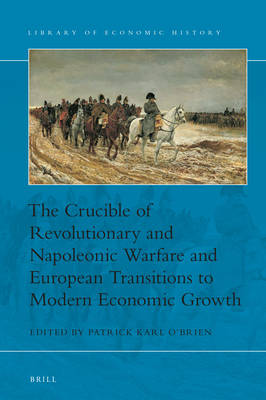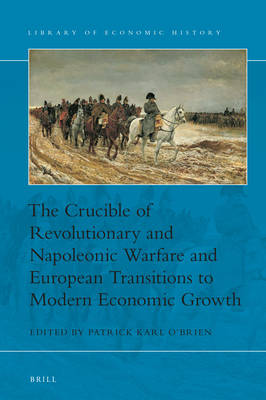
- Afhalen na 1 uur in een winkel met voorraad
- Gratis thuislevering in België vanaf € 30
- Ruim aanbod met 7 miljoen producten
- Afhalen na 1 uur in een winkel met voorraad
- Gratis thuislevering in België vanaf € 30
- Ruim aanbod met 7 miljoen producten
Zoeken
The Crucible of Revolutionary and Napoleonic Warfare and European Transitions to Modern Economic Growth
€ 213,45
+ 426 punten
Omschrijving
Historiographically this book rests on the fact that European transitions to modern economic growth were obstructed and promoted by the Revolution in France and 15 years of geopolitical conflict sustained by Napoleon in order to establish French Hegemony over the states and economies of Britain, France, Germany, the Netherlands, Italy, Spain, Portugal and overseas commerce.
The chapters reveal that their authors concerns to analyse both the nature and significance of connections between geopolitical and economic forces lend coherence to a collaborative endeavour utilising comparative methods to address a mega question. What might be plausibly concluded about the economic costs and the benefits of this protracted conjuncture of Revolutionary and Napoleonic Warfare?
Contributors are: Patrick Karl O'Brien, Loïc Charles, Guillaume Daudin, Silvia Marzagalli, Marjolein 't Hart, Johan Joor, Mark Dincecco, Giovanni Federico, Leandro Prados de la Escosura, Carlos Santiago-Caballero, Cristina Moreira, Jaime Reis, Rita Martins de Sousa, and Peter M.Solar.
The chapters reveal that their authors concerns to analyse both the nature and significance of connections between geopolitical and economic forces lend coherence to a collaborative endeavour utilising comparative methods to address a mega question. What might be plausibly concluded about the economic costs and the benefits of this protracted conjuncture of Revolutionary and Napoleonic Warfare?
Contributors are: Patrick Karl O'Brien, Loïc Charles, Guillaume Daudin, Silvia Marzagalli, Marjolein 't Hart, Johan Joor, Mark Dincecco, Giovanni Federico, Leandro Prados de la Escosura, Carlos Santiago-Caballero, Cristina Moreira, Jaime Reis, Rita Martins de Sousa, and Peter M.Solar.
Specificaties
Betrokkenen
- Uitgeverij:
Inhoud
- Aantal bladzijden:
- 312
- Taal:
- Engels
- Reeks:
- Reeksnummer:
- nr. 15
Eigenschappen
- Productcode (EAN):
- 9789004472730
- Verschijningsdatum:
- 17/12/2021
- Uitvoering:
- Hardcover
- Formaat:
- Genaaid
- Afmetingen:
- 155 mm x 234 mm
- Gewicht:
- 607 g

Alleen bij Standaard Boekhandel
+ 426 punten op je klantenkaart van Standaard Boekhandel
Beoordelingen
We publiceren alleen reviews die voldoen aan de voorwaarden voor reviews. Bekijk onze voorwaarden voor reviews.







